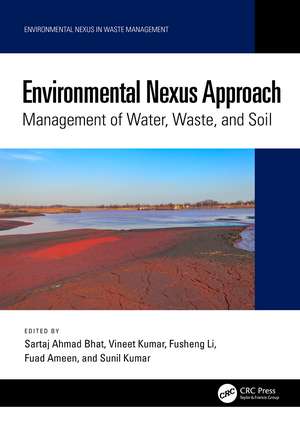Environmental Nexus Approach: Management of Water, Waste, and Soil: Environmental Nexus in Waste Management
Editat de Sartaj Ahmad Bhat, Vineet Kumar, Fusheng Li, Fuad Ameen, Sunil Kumaren Limba Engleză Hardback – 5 sep 2024
Features:
- Explores cutting-edge developments in the environmental nexus approach of water, waste, and soil.
- Introduces the key mechanisms regarding antibiotic resistance genes, microplastics, and other emerging contaminants in the water, waste, and soil nexus.
- Investigates the fate and behavior of heavy metals, polyaromatic hydrocarbons, plastics, and pesticides in soil systems and their risk assessment.
- Provides insights into the latest developments, current research perspectives, technology development, critical thinking, and societal requirements of the environmental nexus between water, waste, and soil.
Preț: 1017.18 lei
Preț vechi: 1240.46 lei
-18% Nou
Puncte Express: 1526
Preț estimativ în valută:
194.70€ • 211.56$ • 163.65£
194.70€ • 211.56$ • 163.65£
Carte tipărită la comandă
Livrare economică 19 aprilie-03 mai
Preluare comenzi: 021 569.72.76
Specificații
ISBN-13: 9781032450292
ISBN-10: 1032450290
Pagini: 420
Ilustrații: 140
Dimensiuni: 178 x 254 mm
Greutate: 0.94 kg
Ediția:1
Editura: CRC Press
Colecția CRC Press
Seria Environmental Nexus in Waste Management
Locul publicării:Boca Raton, United States
ISBN-10: 1032450290
Pagini: 420
Ilustrații: 140
Dimensiuni: 178 x 254 mm
Greutate: 0.94 kg
Ediția:1
Editura: CRC Press
Colecția CRC Press
Seria Environmental Nexus in Waste Management
Locul publicării:Boca Raton, United States
Public țintă
Academic and PostgraduateCuprins
Section I. Environmental Nexus in Water/Wastewater Management. Chapter 1. Role of nanoparticles for removal of heavy metals and dyes from wastewater. Chapter 2. Hybrid treatment technologies for the removal of pharmaceuticals in wastewater. Chapter 3. Bioelectrochemical systems for remediation and treatment of wastewater. Chapter 4. Advancements in conventional and modern waste treatment approaches. Chapter 5. From linear to circular bioeconomy: A paradigm shift in wastewater management. Chapter 6. Biofilm based denitrifying moving bed biofilm reactor (dMBBR) for the removal of nitrate from wastewater. Chapter 7. Mosquito vector management in clean, stagnant and sewage water ecosystems. Chapter 8. Advanced molecular and metagenomic approaches for microbial diversity analysis in wastewater treatment systems. Section II: Environmental Nexus in Waste Management. Chapter 9. Trends in the generation, behaviour, and fate of microplastics from municipal solid waste management systems. Chapter 10. Antibiotic pollution: Toxicity assessment and bioremediation strategies. Chapter 11. Antibiotics and antibiotic resistance genes and their management in organic wastes. Chapter 12. Biofiltration approach for emerging contaminants in organic wastes. Chapter 13. Microbe assisted enzymatic degradation of microplastic. Section III: Environmental Nexus in Contaminated Soil Management. Chapter 14. Different technologies for contaminated soil remediation: hurdles and perspectives. Chapter 15. Polyaromatic hydrocarbons: Sources, detection, risk assessment, and remediation. Chapter 16. Organic amendments in soil systems for sustainable ecosystem. Chapter 17. Environmental risk and managements of microplastics in soil. Chapter 18. Bioindicators: Natural biotic sensors of environmental pollution and ecological disturbance. Chapter 19. Microbial community and management of soil health for environmental sustainability: Concept, Trends, and Prospects. Chapter 20. Sustainable approach for management of organic waste agri-residues in soils for food production and pollution mitigation
Notă biografică
Sartaj Ahmad Bhat is working as JSPS Postdoctoral Researcher at the River Basin Research Center, Gifu University, Japan. His primary research focuses on the development and evaluation of treatment technologies for organic waste and wastewater from domestic and industrial outlets as well as organic waste recycling, with a focus on the biological and sustainable treatment by earthworms.
Vineet Kumar is presently working as a National Postdoctoral Fellow in the Department of Microbiology, School of Life Sciences at Central University of Rajasthan, Rajasthan, India. His research work mainly focuses on the development of integrated and sustainable treatment techniques that can help in minimizing or eliminating hazardous waste in the environment.
Fusheng Li is a Professor in the Graduate School of Engineering at Gifu University, Japan. Prof. Li is directing the Division of Water Quality Studies that covers the fields from water quality to water and wastewater treatment, and recently to resource and energy recovery from organic waste.
Fuad Ameen is an Associate Professor and Researcher at the Department of Botany and Microbiology, College of Science, King Saud University, Riyadh, Saudi Arabia. He graduated his Ph.D. on biodegradation of urban waste by mangrove fungi from King Saud University, Saudi Arabia. After that, he has been involved in many kinds of projects dealing with new solutions to treat polluted sites.
Sunil Kumar is a well-rounded researcher with more than 22 years of experience in leading, supervising, and undertaking research in the broader field of Environmental Engineering and Science with a focus on Solid and Hazardous Waste Management.
Vineet Kumar is presently working as a National Postdoctoral Fellow in the Department of Microbiology, School of Life Sciences at Central University of Rajasthan, Rajasthan, India. His research work mainly focuses on the development of integrated and sustainable treatment techniques that can help in minimizing or eliminating hazardous waste in the environment.
Fusheng Li is a Professor in the Graduate School of Engineering at Gifu University, Japan. Prof. Li is directing the Division of Water Quality Studies that covers the fields from water quality to water and wastewater treatment, and recently to resource and energy recovery from organic waste.
Fuad Ameen is an Associate Professor and Researcher at the Department of Botany and Microbiology, College of Science, King Saud University, Riyadh, Saudi Arabia. He graduated his Ph.D. on biodegradation of urban waste by mangrove fungi from King Saud University, Saudi Arabia. After that, he has been involved in many kinds of projects dealing with new solutions to treat polluted sites.
Sunil Kumar is a well-rounded researcher with more than 22 years of experience in leading, supervising, and undertaking research in the broader field of Environmental Engineering and Science with a focus on Solid and Hazardous Waste Management.
Descriere
This book provides the linkages between environmental resources, such as water, waste, and soil to deal with sustainable management of resources. This book is aimed at graduate students and researchers in environmental science and engineering, environmental engineering, and waste management.




